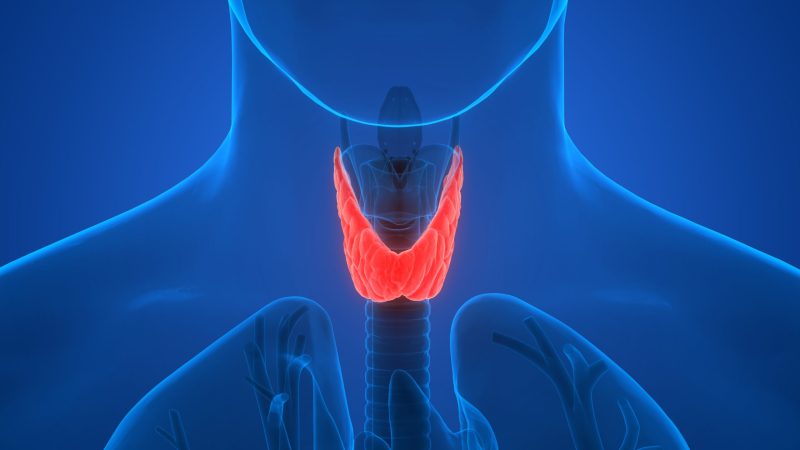
The symptoms of thyroid problems are more common than you can imagine. Estimates indicate that around 1.3% of the population suffers from hypo- or hyperthyroidism (with a prevalence of 2.7% in women and 0.23% in men).
Are you freezing? Do you feel more tired than usual even though you slept 8 hours? Are you worried about your mood swings? You may be recommended to go to the doctor’s office since all these signs could be symptoms of various thyroid problems. Stay with us and discover the most relevant.
Contents
What is the thyroid?
The US National Library of Medicine explains that the thyroid is a butterfly-shaped gland in the neck. Now, what is it for?
It produces hormones that manage fundamental body processes, such as burning calories and heart rate. For this reason, thyroid problems must be diagnosed and treated correctly.
They are several and very differentiated, although the best known is hypothyroidism, the deficiency of thyroid hormones. In addition, there are other problems.
- Hyperthyroidism: Exaggerated production of thyroid hormones.
- Nodules: the presence of lumps in the tissue of the gland.
- Goiter: enlarged gland.
- Thyroiditis: inflammation in the thyroid.
- Thyroid cancer.
When suffering from symptoms of thyroid problems, a person can experience both physical and psychological signs. Someone living with hypothyroidism will not only show changes in body weight, for example, but could also have depression.
Below, we will discuss the most common symptoms of thyroid problems. If several of them are experienced, seeing a doctor for a timely evaluation is recommended.
The 13 most frequent symptoms that indicate thyroid problems
The symptoms listed below may suggest the presence of a disease of the thyroid gland. However, they can also respond to another disorder. That is why professional consultation and examinations are needed to reach an accurate diagnosis.
For accurate detection, it is essential to perform these blood tests.
- Thyroid-stimulating hormone (TSH) is the first measurement when there is suspicion.
- Thyroid antibody test: measures antibodies that could attack the gland.
- T3 and T4: measure different hormones produced by the gland.
- TSI: measures thyroid-stimulating immunoglobulin.
1. Fatigue and tiredness
The thyroid plays a vital role in regulating the body’s energy levels. So suffering from fatigue is often a sign that something is wrong. In general, it is associated with hypothyroidism.
A person with hypothyroidism problems will need to sleep a lot, even with 8 or 10 hours of rest a day, in addition to a nap. Lack of energy to complete daily tasks.
Fatigue also responds to other causes. For this reason, a differential diagnosis must be established with other conditions, as indicated by a study published by the journal Nursing for Women’s Health.
At the same time, muscle weakness is not uncommon either. This signal is different from but contributes to fatigue. It is a depletion of the muscles that fail to contract properly. Several researchers from the Republic of Moldova highlight some of the most relevant bibliographic data to warn about musculoskeletal deterioration in primary hypothyroidism.
2. Weight gain or loss
The thyroid gland is responsible for regulating the rate of metabolism, which is the process by which the body uses calories and makes energy. Therefore, a thyroid evaluation is usually requested when there is a variation in the person’s body weight.
A sudden weight gain can be a sign of hypothyroidism. Conversely, if there is unexplained weight loss, this could indicate hyperthyroidism.
Despite this, it is not always fulfilled in the same way. That is, it does not mean all hyperthyroid patients will be thin. Recent analyzes published by the International Journal of General Medicine postulate that weight variation as such is the symptom (either more or less), and this does not mean that obesity necessarily goes hand in hand with hypothyroidism. Nor thinness with hyperthyroidism.
3. Mood swings
When there is discomfort in the body, it is normal for emotional ups and downs to occur. The disorders can range from increased general sensitivity to pictures of depression, anxiety, and stress.
In any case, it is essential to emphasize that slight variations in the values of the hormones are not enough to reach a depressive picture or generalized anxiety. Experts from the American Thyroid Association point out that mental health disorders are associated with specific thyroid diseases and not with minor changes in blood levels of TSH or T4.
In either case, it is convenient to ask for psychological support and maintain healthy habits. Follow the doctor’s instructions regarding the appropriate hormonal treatment.
4. Discomfort and general ailments
Frequent muscle pain (myalgia), joints (arthralgia), and tendons could be symptoms of a hormonal disorder of the thyroid gland. This is not a significant symptom, so other signs should be considered before a diagnosis.
If there is an established thyroid disease, a characteristic picture may occur: thyroid myopathy. Patients experience cramps and muscle pain that can be very intense. They are corrected with adequate treatment of hypothyroidism, which is usually the most associated disorder.
5. Reproductive difficulties among the symptoms of thyroid problems
The imbalance of thyroid hormones could cause a woman to have more difficulties conceiving and alterations in the menstrual period. Even the specialist Virginia Busnelli indicates in her book that she encourages a lack of sexual desire.
Women with uncontrolled thyroid disease tend to have irregular menstrual cycles. Even, as a study published in 2023 by the Multidisciplinary Peered Scientific Journal PENTACIENCIAS warns, slight variations in the concentration of hormones may be enough to alter periods.
Different scientific studies have found an association between thyroid problems and delayed conception. Even so, it is not clear if all women must have a blood test of their hormones in case of trying to become pregnant.
6. Poor regulation of body temperature
The thyroid is an organ that plays a fundamental role in regulating body temperature. Therefore, it is responsible for maintaining the appropriate internal degrees for the body to function normally.

Feeling cold hands or feet and the rest of your body can often be a sign of hypothyroidism. On the contrary, intense heat in winter is associated with dysregulation of hyperthyroidism.
7. Nail, skin, and hair problems
When skin, hair, and nails look bad, they can be warning signs of something wrong. Dry skin, hair loss problems, and cracked nails are common signs of thyroid disorders.
Experts from the Brazilian Annals of Dermatology comment that various mechanisms influence the dermatological changes that afflict patients. For example, people with hypothyroidism accumulate more carotene in their skin and tend to have a yellowish tone without being jaundiced. On the other hand, the hair growth cycle is disturbed. This causes him to fall prematurely.
The sebaceous glands do not produce enough sebum, or their expulsion is slowed, favoring the ducts’ obstruction. That is why people with thyroid disorders have a higher incidence of hidradenitis suppurativa.
8. Constipation or constipation
All bodily processes slow down by lowering the thyroid gland’s hormonal activity. The bodies have difficulties in adequately fulfilling their functions.
In the case of digestive functions, there are problems absorbing nutrients from food and difficulty eliminating waste through the digestive tract. The result could be a severe case of constipation.
In older patients, this problem is combined with the dysfunction of aging. For this reason, after age 65, as indicated by a study by the Universidad Clínica de Navarra, diagnosis becomes more complex, and constipation can be more severe in someone with hypothyroidism.
9. Cognitive disturbances are symptoms of thyroid problems
People with thyroid problems often complain of poor memory and difficulty concentrating. This is due to the decreased production of hormones in hypothyroidism and the inability to focus attention in hyperthyroidism.
10. Voice changes
When there is a thyroid problem, the gland likely becomes inflamed or enlarged. When it occurs, pressure on the neck leads to a sore throat and hoarseness.

Goiter is capable of causing a change in the voice known as “bitonal,” as indicated by a study at the University of Andalusia. This not only occurs due to pressure on the larynx but there could also be compression of the laryngeal nerve, which affects the mobility of the vocal cords.
11. Changes in blood pressure
There is a proven influence of several Hungarian researchers on thyroid disorders on blood pressure. The varied metabolic changes influence, together, to favor the development of hypertension.
However, indirect signs are perceived. Unless you measure the pressure, you won’t know if it rises or not; Therefore, regular control of values is recommended, especially after 40 years of age.
12. Sleep disorders as symptoms of thyroid problems
All metabolic changes can be responsible for worse rest: the same accumulated fatigue, intolerance to cold or heat, stress, and anxiety are just a few examples. Then, a vicious circle is entered; insomnia can prolong the negative signals of the dysfunctional gland.
13. Arrhythmias
Arrhythmias are changes in heart rate and disturbances in the heart’s rhythm. These may come from a thyroid hormone imbalance.
Bradycardia, a reduced heartbeat rate, is more common in patients with hypothyroidism. On the contrary, tachycardia manifests itself when there is an excess of thyroid hormones in circulation, leading to the heartbeat’s acceleration.
According to a recent publication in the Revista Colombiana de Cardiología, cardiac problems associated with the thyroid complicate the patient in two directions. On the one hand, with them, the cardiovascular risk is increased, which is even associated with an increase in mortality; on the other, it becomes more difficult to medicate and control the underlying hypo- or hyperthyroidism.
What to do when faced with the symptoms of thyroid problems?
In many cases, thyroid problems go undetected long after they start, as their early symptoms are often confused with other conditions. Therefore, it is essential to know the signs if it is suspected and start the path to early diagnosis.
In case of experiencing several of these symptoms, it is necessary to consult with the doctor so that he can do the respective tests. Also, if you have a family history, having regular checkups doesn’t hurt to ensure everything is okay.